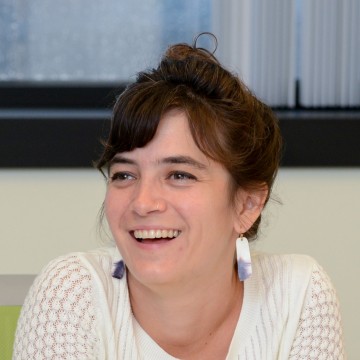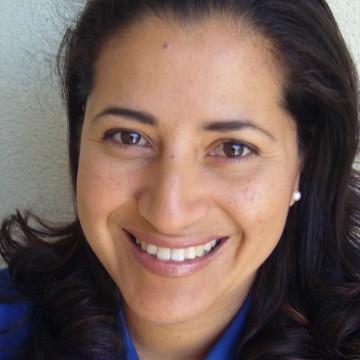May 8, 2017
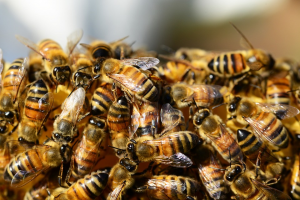
One of the many things I appreciate about adrienne maree brown’s new book, Emergent Strategy: Shaping Change, Changing Worlds, are the questions she asks over and over again: what are you learning from nature? how does nature inform your organizing and movement building efforts?Autumn Meghan Brown, interviewed in this book, talks about consensus. Building consensus is one of my favorite practices to teach in IISC’s Facilitative Leadership for Social Change workshop. People love consensus and people hate it; I’ve seen many people struggle with when and where consensus is the appropriate decision making method, and with how to facilitate an effective consensus decision making process.
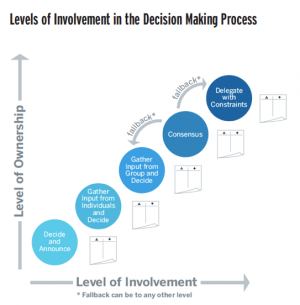
IISC’s Framework: “Levels of Involvement in the Decision Making Process,” above. © 2013 Interaction Institute for Social Change. All rights reserved.
I believe two reasons for this are that we live in a society with an unhealthy relationship to time, and with a low level of skill for collaborative group process. Autumn says these wise things about consensus:
- The history of consensus is deeply rooted in feminist and Indigenous movement work
- Building consensus is the work of collective liberation
- People want consensus to be an antidote to power, but it is not! Consensus does not require equal status; it requires equal voice.
So back to brown’s question, where does consensus happen in nature? What might we learn from nature about consensus?
Read More
July 11, 2016
If you watch the videos of Alton Sterling and Philando Castile’s murders (which I do not encourage if it will be triggering for you, but I DO encourage if you are not Black and you have been feeling numb to and overwhelmed by the most recent violence as I have been), you will see White or light skinned police officers shooting two different Black men in two different cities in the arm and stomach from less than six inches away. How do you pull the trigger on someone whose face you are looking at while your body is pinning theirs down on concrete (for selling CDs on a sidewalk) or while they reach for their driver’s license (after being pulled over for a busted tail light) as you asked them to?!? Seriously. HOW DOES THIS HAPPEN. I mean I can answer it intellectually, with structural racism and implicit bias reasons. But it is a deeply spiritual human question as well. I hear panicked fear in both of these White or light skinned cop’s voices after they have pulled the trigger in these videos; as if they did something they had no control over, or they surprised themselves, or they know their career is in jeopardy, or what, I can’t know for sure. My stomach turns. You will also see Philando’s fiancee being a stronger woman than I could ever imagine myself being in the same situation (and her daughter too…), dealing with the unspeakable, handcuffed right after the shooting and kept that way in the back of a car before an ambulance even arrived, and while her fiancee died. That fear I heard in the police officers’s voices makes me so sick and sad. It is pathetic. It is deep White rage and White fragility and White supremacy twisting our souls into ugly fractions of what they could be. We White people have got to get our shit together. This is too much, too long, too sick, too inhumane. #BlackLivesMatter
NOTE: I have made some minor edits to this post as of 7/8 because it seems that one of these cops may not be White, but a light skinned man whose ethnicity I do not know yet. Anti-Black racism is a persistent problem in all non-Black groups, and White rage and supremacy do not plague only White people.
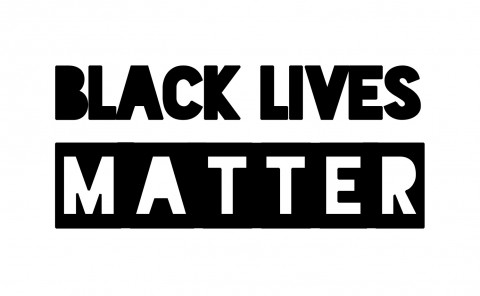
January 8, 2016
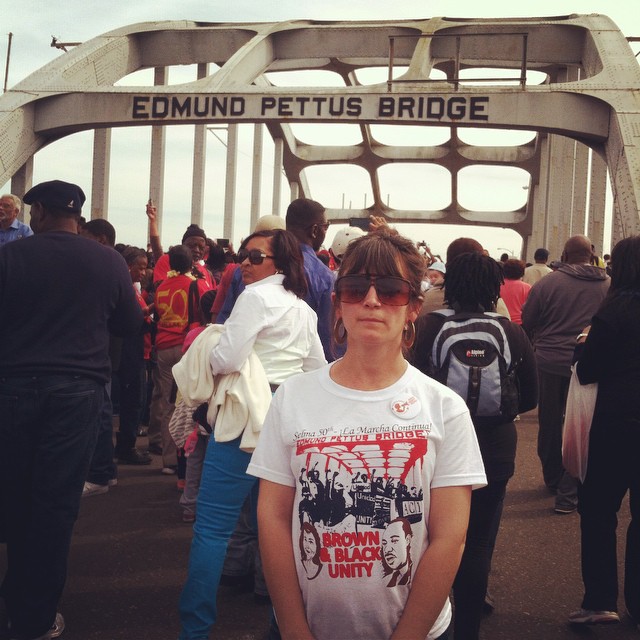
Jen Willsea at the Edmund Pettus Bridge for the 50th anniversary of Bloody Sunday in Selma, Alabama. March 2015.
I am angry that the murder of Tamir Rice is being explained away as a “perfect storm of error”[1] in Cleveland, that Sandra Bland is being blamed for her own death in Texas, and that police in Chicago chose to “shoot first and ask questions later,”[2] killing two more unarmed African Americans the day after Christmas.
When will we stop recycling, reinventing, and reinforcing American racism—the same old oppression in new forms? Why have we allowed it to persist for so long and why do we continue to explain it away, denying the magnitude and depth of racism as it manifests the 21st century while wary of the ways our past is actually impacting the present? Read More
December 16, 2015
Our eyes met and locked a split second after we noticed the feet of two young men sitting next to each other in the circle – both had a pant leg rolled up to show an ankle monitor. In the same circle, sat two sheriffs with guns and tasers strapped to their hips and covered by their untucked shirts. It was day three of our training, Moving Forward in Addressing Race, Power and Privilege, and we were now harvesting the fruits of many hours of challenging mental, emotional and spiritual work.
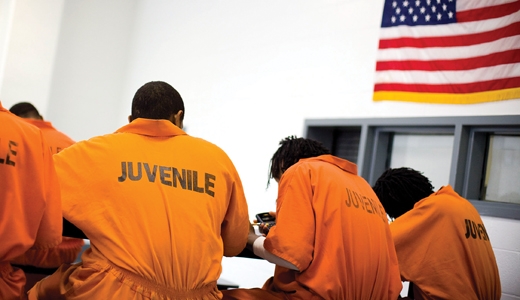
“I have learned to see that not all police officers are rude and mean,” shared a 14 year-old Latina girl. “I have learned that some officers care about me and want to be fair; this is the first time I’ve been in a space where I felt heard by adults (in the system).”
Having law enforcement at the table with an openness to change is important. Systems are made up of individuals. Individuals centered on equity values and skilled in moving policy forward, in partnership with multi-sector networks towards common goals, can create long term change.
“I have gained sight and vision where before I was blind,” shared a white male law enforcement officer, “and I am willing to give what ever it takes personally and professionally to our cause.” Read More
September 18, 2015
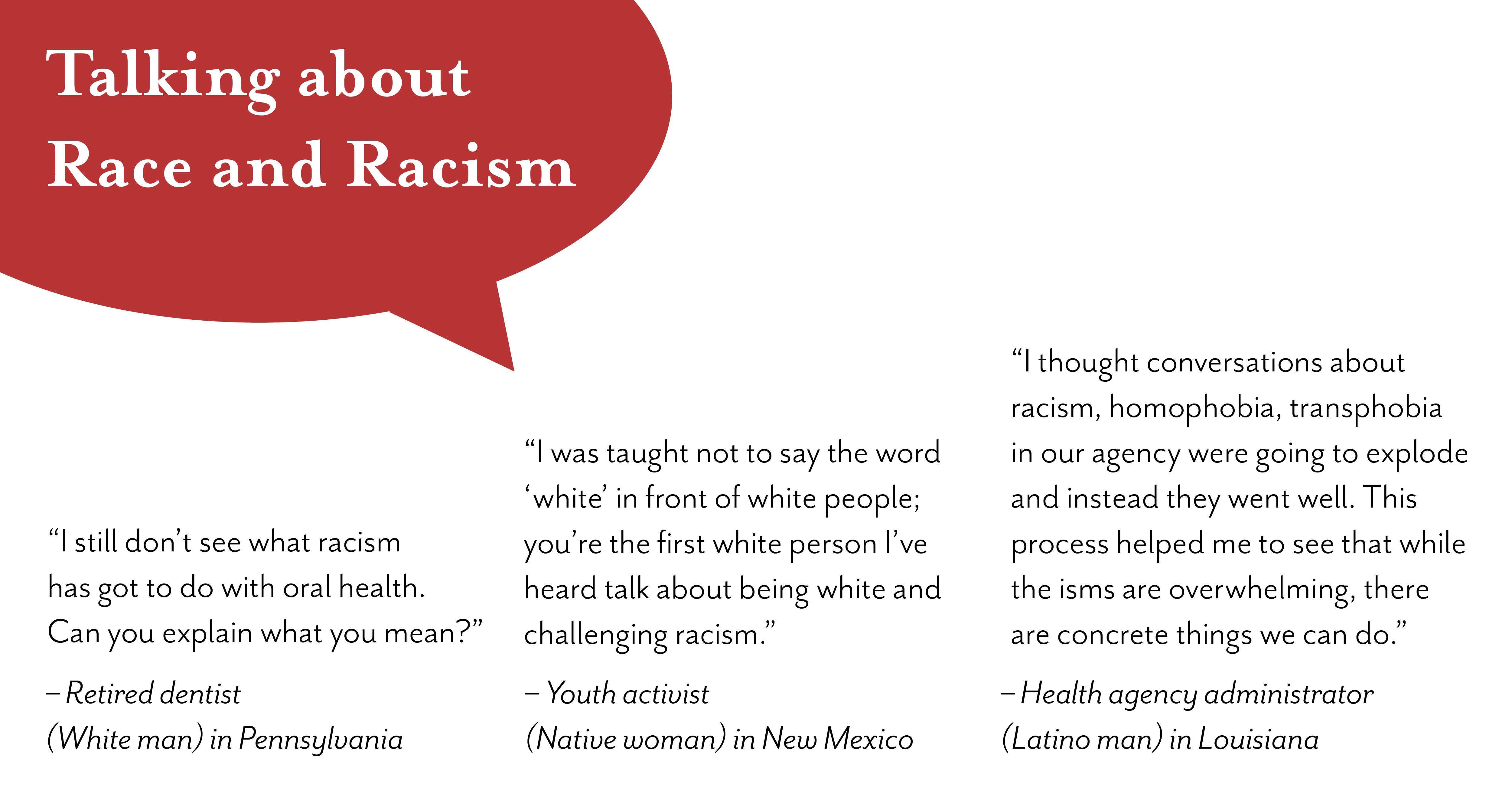
These three moments with these three individuals in recent months have stuck with me. Each of them is part of a multicultural group of folks working to integrate racial equity in their work – whether it be for youth in the juvenile justice system, for children and adults to get quality and affordable dental health care, or for people with HIV. They got me reflecting about what it takes to move racial equity work forward in multiracial, mostly white, collaboratives and institutions. And about how much I love the challenge of moving this work forward in settings where talking about race and racism is NOT the norm.
“I was taught not to say the word ‘white’ in front of white people; you’re the first white person I’ve heard talk about being white and challenging racism.”
— Youth activist (Native woman) in New Mexico
Read More
March 10, 2015
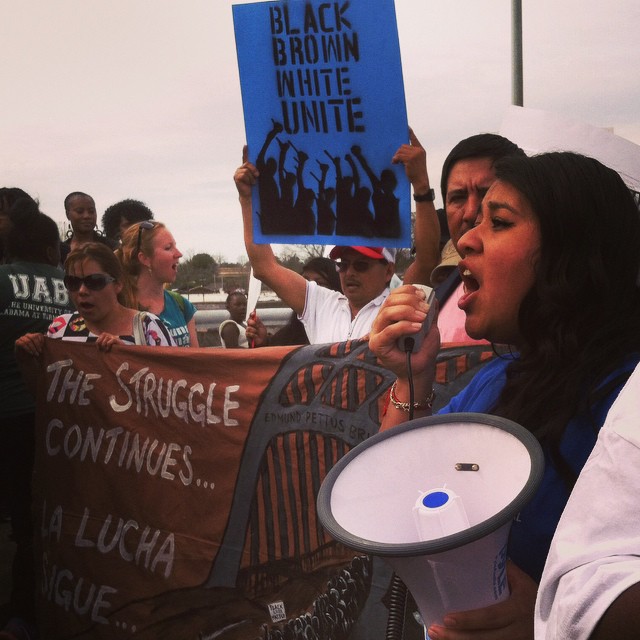
Alabama Coalition for Immigrant Justice marching across the Edmund Pettus Bridge on 3/8/15 by Jen Wilsea
The news channels have been flooded for the last few days with photos of the Obama family crossing the Edmund Pettus Bridge, the very bridge that Alabama state troopers and local police would not allow peaceful voting rights activists to cross as they attempted to march from Selma to Montgomery on March 7, 1965. That day is remembered as Bloody Sunday because police attacked the marchers with tear gas and billy clubs, resulting in the hospitalization of many protestors, including John Lewis.
Hour after hour ticked by as I stood on the main street in Selma on March 7, 2015. The sun was hot and I was getting sunburned. I stood in the middle of a sea of overwhelmingly Black Southerners waiting for our Black president to arrive. Words can’t describe the calm yet electric feeling in the air. It was powerful to wait, and to see the Edmund Pettus Bridge just a few blocks ahead, knowing that at any moment President Obama would stand there and speak to this crowd, this mostly Black, Southern crowd. Read More
January 19, 2015
“Through our scientific and technological genius, we have made of this world a neighborhood and yet we have not had the ethical commitment to make of it a brotherhood. But somehow, and in some way, we have got to do this. we must all learn to live together as brothers or we will all perish together as fools. We are tied together in the single garment of destiny, caught in an inescapable network of mutuality. And whatever affects one directly affects all indirectly. For some strange reason I can never be what I ought to be until you are what you ought to be. And you can never be what you ought to be until I am what I ought to be.” – Dr. Martin Luther King, Jr. “Remaining Awake through a Great Revolution”
Recently I have been blown away by the ability of people, in the midst of racialized tension and harsh accusations, to move through insults and injuries, listen deeply to one another, account for the hurtful impacts of their behaviors, and recommit to a new level of partnership and trust. I have witnessed this kind of healing among a multiracial group of people including government employees and grassroots community leaders I am working with in a U.S. city. These folks are coming up against the same big barriers I believe all of us doing racial justice work are coming up against: people acting from unspoken and deep-seated sets of cultural values that are seemingly at odds and a lack of common language to understand how racism is playing out in our communities. Without addressing these barriers, it is too easy for us to take things personally, become defensive, and continue believing that folks who don’t think exactly like us are wrong or inferior. We can go along collaborating and making surface-level reforms, but I think it is time for us to do the deeper work.
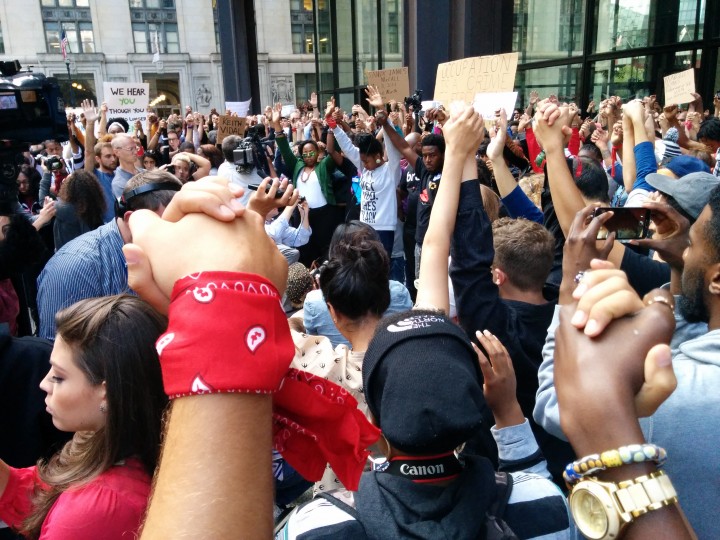
Image from TransformativeSpaces.org”On the Eve of Reclaim MLK” Read More
October 15, 2014
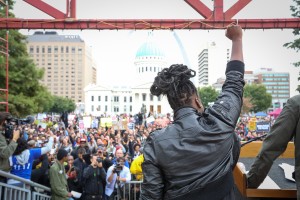
Photo source: Democracy Now
Last weekend, thousands of activists converged in Ferguson, Missouri for Ferguson October, a weekend of resistance including marches, panels, creative actions and civil disobedience. The purpose of the weekend was “to build momentum for a nationwide movement against police violence.” Two months ago, an unarmed Black man, Michael Brown, was killed in Ferguson by a white police officer who has not yet been arrested. While Mike Brown’s death was not an anomaly – at least two African American males are killed by law enforcement every week in the U.S. – the energy that is building in Ferguson, the organizing that is deepening there, the connections between Black activists and racial justice advocates of all races across the country that are being forged, and the new level of attention that Ferguson is bringing to this disturbing trend across the nation is new. I believe that we are in the midst of a crisis in this country. I believe that the young people and their allies who are on the front lines in Ferguson are calling all of us to action.
I believe this “movement moment” as many are calling it is about much more than Ferguson. This moment is opening up new opportunities for us to face and undo racism in all of its forms in all corners of this country. Let us finally declare that #BlackLivesMatter, all lives matter, and make this our reality. Read More
September 2, 2014
This post is a continuation of “We are in the midst of a crisis in this country.”
Over the last few days, Black activists from cities across the U.S. joined the Black Life Matters Ride, traveling to convene for a historic weekend in Ferguson, Missouri as part of a national call to end state sanctioned violence against Black people. We have a lot to learn from what’s going on in Ferguson right now and it seems that a window of opportunity is opening for the moment to become a movement, one that is about Michael Brown’s death at the hands of a white police officer and that also about so much more. We need to get to the root of these problems if we are going to end state sanctioned violence against Black people once and for all, rather than end up with yet another version of Jim Crow era state-sanctioned lynching.
If we could only eliminate police officers with racist attitudes from police forces, wouldn’t that take care of this problem? I am afraid it would not.
What will it truly take to end state sanctioned violence against Black people?
First, we need to start collecting national data on police stops and use of force and thankfully there are folks working on that.
Second, we must uproot much more than explicit racial prejudice. Some of the most illuminating research about police violence I know of is being done by Dr. Philip Goff, president of the Center for Policing Equity. Goff reminds us that attitudes only predict 10% of behaviors. Behaviors are actually much more heavily influenced by unconscious brain activity and biases. I’ve heard Goff present his research a couple of times at the W.K. Kellogg Foundation America Healing Conference and I was surprised to learn that explicit racial prejudice is not the biggest predictor of police officers’ use of deadly force. Instead, over 80% of incidents that involved police use of deadly force were preceded by threats to the officers’ masculinity. Masculinity threat is a more reliable predictor of a police officer pulling the trigger than racist beliefs. In the U.S., men of color are stereotyped as hyper-masculine, so it is impossible to separate masculinity threat from conscious and unconscious racial biases.
As a white person, I am challenging myself not to demonize or otherize white police officers who are committing violent acts against men of color. Why? Because we need to ask what is going on in the minds and hearts of people like Darren Wilson, the officer who killed Michael Brown, and Johannes Mehserle, the former San Francisco BART police officer who killed Oscar Grant. The moment I distance myself from white people like them, I am in danger of reinforcing the notion that racist violence is something I can blame someone else for, thus extricating myself from both the problem and the solution. White brothers and sisters, none of us is free from this haze of fear and disillusionment until all of us is free from it. We have got to have conversations about both the conscious and unconscious dimensions of racism, and about the interdependency of white supremacy and patriarchy. We white folks have got to take responsibility for engaging other white folks in these conversations. And we have to do this until we no longer hear things on the mainstream news like “You know who talks about race? Racists.”
August 15, 2014
We are in the midst of a crisis in this country. When a split second decision by one person results in multiple wounds or death for a young man or young woman. Because he didn’t get off the sidewalk quickly enough? Because his music was too loud? Because she knocked on your door? No, these are not the reasons. All of these young people happen to be black. This is not a coincidence.
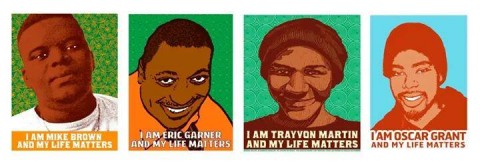
Image credit: Dignidad Rebelde
Read More
July 9, 2014
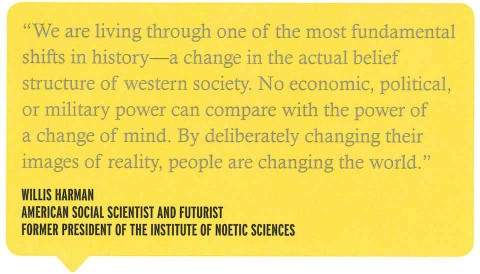
Two recent graduates of a Facilitative Leadership for Social Change workshop Mistinguette Smith and I led in New York, Alison Gold and Juan Sebastian Arias from Living Cities, recently wrote to us about a creative way they are bringing the frameworks and tools they learned back to their organization. So many of you ask us for advice about how to apply this stuff that we thought you’d want to know about it too! Read More
June 27, 2014
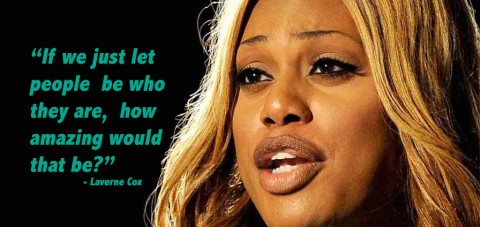
Transgender women of color are finally making a (positive) splash in the mainstream media. Janet Mock, a writer, has been getting accolades for her new memoir, Redefining Realness: My Path to Womanhood, Identity, Love and So Much More; Laverne Cox, an actress in Orange is the New Black, was recently on the cover of Time magazine; and CeCe McDonald is increasingly being recognized as a trans activist leader.
On June 5, 2011 in Minneapolis, CeCe McDonald and her friends were passing a bar on the way to a grocery store when they were accosted with homophobic, transphobic, and racist slurs. CeCe defended herself with a pair of fabric scissors in her bag. She was accused of murder even though she acted in self-defense, jailed for defending herself against bigotry and violence that transgender people often face. The judge rejected considerations of how gender, sexual orientation, race, and class played into the situation; statistics that trans people are more at risk for hate violence; the swastika tattoo on the attacker’s chest and his three previous convictions for assault; as well as the meth, cocaine, and alcohol present in the attacker’s system.
In this Democracy Now! clip from February 19, 2014, CeCe (after her release from prison) and Laverne talk about why black trans bodies matter. It is a must watch for anyone who cares about human beings and wants to better understand what is at stake in the movement for trans liberation. As a cisgender (in other words, non-trans) queer white woman, I am inspired and humbled by these two fierce trans women’s words.
“I know what is like to always have this guard up because you don’t know when somebody will literally try to kill you for just being who you want to be…. I’ve yet to hear of a trans woman who has just lived her life happily….” CeCe McDonald
Why do we insist that there are ok expressions and not ok expressions of masculinity and femininity?
When will we stop policing people’s gender expressions?
When will we start allowing ourselves to see people who challenge mainstream notions of gender not as freaks who are offensive or dangerous, but as beautiful people with unique gender wisdom?
Many trans people are warriors on the front lines, fighting for liberation from restrictive and false gender norms. When will we wake up and see that this fight is one that all of us, people of all gender identities, will benefit from?
Laverne calls us to the future we can all be a part of creating if we choose to:
“How do we create spaces in our culture where we don’t stigmatize trans identity, where we create spaces of gender self-determination? It is so often acceptable to make fun of trans people, to ridicule trans people. When we look at the epidemic of violence against trans people so many people think that our identities are inherently deceptive, inherently suspect, and that we should be criminalized because of that. In Arizona they were trying to criminalize going to the bathroom last year. How do we begin to create spaces where we accept trans people on trans people’s own terms and let trans people lead the discussions of who we are and what the discussion about what our lives should be?” Laverne Cox
Keep an eye out for the release of the documentary, FREE CeCe, to learn more about CeCe’s story and the culture of violence experienced by trans women of color.

